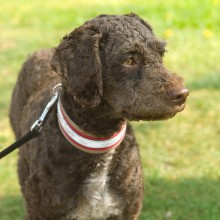Lagotto Romangnolo
Lifestyle Needs
 The Lagotto Romagnolo is a dog breed from Italy. Translated its name means ‘curly coated duck retriever’ and Romagne is the district in northern Italy where the breed was developed. The acute scenting power of the Lagotto has been used more recently for truffle hunting. He is new to the UK and should be regarded as a retrieving dog. His coat will need to be groomed often and trimmed when necessary. He needs to have a country life and live in a house with a large garden or have access to the open countryside. More than two hours exercise is needed every day.
The Lagotto Romagnolo is a dog breed from Italy. Translated its name means ‘curly coated duck retriever’ and Romagne is the district in northern Italy where the breed was developed. The acute scenting power of the Lagotto has been used more recently for truffle hunting. He is new to the UK and should be regarded as a retrieving dog. His coat will need to be groomed often and trimmed when necessary. He needs to have a country life and live in a house with a large garden or have access to the open countryside. More than two hours exercise is needed every day.
Genetic Diversity
(Known as Coefficient of Inbreeding: 'COI'. It should be as low as possible.)
The UK Kennel Club breed average COI is 3.5% - See 'A Beginners Guide to COI'
Gene Pool Size
(Known as Effective Population Size: 'EPS')
TBC
EPS is a measure of how many individuals are contributing genetically to a breed population. It is a measure of the size of the gene pool in a breed. Lower than 100 is considered critical by conservationists and below 50 brings a breed close to extinction. For more information see the Kennel Club article.
Health and Welfare Problems due to Conformation
(Body shape and physical characteristics)
None known
BVA/KC Health Schemes: www.bva.co.uk/chs
- Hip dysplasia: breed 5 year mean score 13.5 (parents should be lower).
- Elbow dysplasis
- Eye Scheme
Estimated Breeding Values (EBVs) : No EBVs are currently available for this breed
www.thekennelclub.org.uk/about-ebvs
DNA Tests Available
DogWellNet and IPFD Harmonisation of Genetic Testing for Dogs (HGTD)
www.dogwellnet.com/breeds
- Hyperuricosuria HUU
- Benign Familial Juvenile Epilepsy
- Lagotto Storage Disease (Lysosomal Storage Disease)
Availability of a DNA test does not mean that it is always necessary or even desirable for breeders to use this test.
Other Breed-Specific Health Screening Schemes
Ask the breeder to show you the certificates for the above tests/screening for both parents. If any of the above tests have not been considered necessary by the breeder (and there may be good reasons), ask her to explain why.
Other Diseases Reported
(For which there are currently no genetic or screening tests for sire or dam)
Patella luxation
Ask the breeder about the medical history of the parents, grandparents and great grandparents. Consider carefully whether to purchase a puppy if some of these or other diseases are in the family line.
Ask about the breeder’s policy in cases of serious genetic diseases occurring to your puppy in later life. Good breeders will request to be informed of such events in order to improve future breeding decisions.
You are strongly advised to buy from a breeder who uses (or is prepared to use) the AWF Puppy Contract and Puppy Information Pack (PIP): www.puppycontract.org.uk
The breeder should also be familiar with the CFSG/DBRG Code of Practice for Dog Breeding